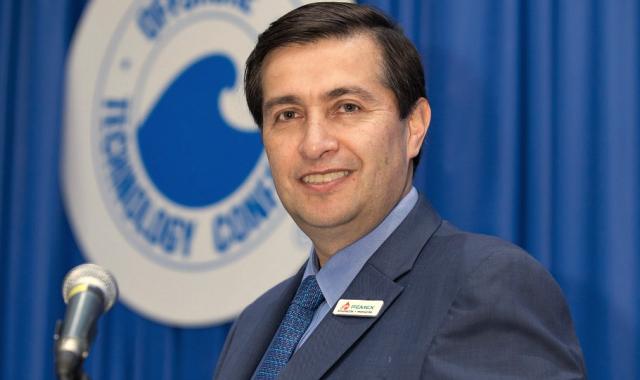
The successful transformation of Pemex from a decentralized public entity into a state-owned productive enterprise will be driven by several key factors—including a healthy dose of both competition and partnership, according to Gustavo Hernández-García, acting director for exploration and production at the Mexican national company.
As Hernández-García spoke to a packed house during a Nov. 6 breakfast, “Mexico Energy Reform: Challenges and Opportunities,” during OTC 2014, he explained that although the nation is well on its way to opening the market to private investment, there is still work to be done at Pemex.
The company, which is the only entity that’s been able to develop hydrocarbons in Mexico during the last 76 years, is undergoing a major transition from reforms that got underway in December. Sweeping changes by the Mexican government, some of which are still in play during the multiyear process, are designed to permit foreign investment into the country’s energy market and open it to some competition. Through profit-sharing, production-sharing and licensing agreements, Mexico has high hopes for foreign investment. Internationally, companies are hoping to capitalize on opportunities to produce the abundant resources beneath Mexico, which include the Eagle Ford Shale geology just south of the Rio Grande River.
Essentially, Hernández-García explained, Pemex will be dedicated to exploring and producing for value.
“The change is a major overhaul for Pemex,” he said, adding that the chief goal for Pemex will be multifaceted: to be the best investment option for monetization of Mexico’s hydrocarbons, to quickly transform into a competitor in an increasingly technical environment and to obtain strategic partnerships.
An early step for Pemex leadership will be to join the very competitive professional market in which its top workers are paid according to the market established by the industry, he said. The inclusion of competition will impact the hydrocarbon value chain, and it will generate a variety of changes within the company, including salary changes for some of the company’s professionals.
“We would like to be a competitive company, but at the same time, we need to pay competitively. We have to convince people that we are committed to retaining talent [and] we will be competitive according to the international market,” he said, adding that Pemex will need to move in a “different way than we have in the past.”
Hernández-García said Pemex looks forward to partnering with other companies, particularly in areas where Pemex doesn’t have precise expertise, such as unconventionals, deepwater, mature fields and shallow water. Whereas Pemex has been the only operator in Mexico and had to contract with service companies, the reforms will put partnerships on the table. Those relationships will be key to bringing much-needed technological expertise, as well as capital, to the company, he said.
To foster growth in potential partners’ interest, Pemex must adopt a business model that includes risk-reward parameters, valuation strategy and portfolio management. What’s more, though, the company must develop a value proposition to position it as an attractive partner. And, Hernández-García said, “We need the ability to choose the right partner.”
What’s more, Pemex leaders are preparing to compete for the first time to secure acreage during upcoming bidding rounds. As such, the company is working to foster transparency and accountability with a results-oriented culture that operates in a “fishbowl” environment, he said.
All that activity will be subject to new mandates and newly created commissions designed to enforce those mandates, he said. Agencies to oversee energy regulations, environment and safety—equipped with appropriately trained technical staff—will be critical to the reforms’ success.
All told, Hernández-García said these efforts are designed to increase operations, share risk and bring together capital and technology that will strengthen the company.
“More players and more investments will equal more production and more revenue for the country,” he said, adding that a critical function of the reform is to convince players on the world stage that “they can go to Mexico to invest, because we have a lot to offer.”
Recommended Reading
President: Financial Debt for Mexico's Pemex Totaled $106.8B End of 2023
2024-02-21 - President Andres Manuel Lopez Obrador revealed the debt data in a chart from a presentation on Pemex at a government press conference.
Kimmeridge Fast Forwards on SilverBow with Takeover Bid
2024-03-13 - Investment firm Kimmeridge Energy Management, which first asked for additional SilverBow Resources board seats, has followed up with a buyout offer. A deal would make a nearly 1 Bcfe/d Eagle Ford pureplay.
M4E Lithium Closes Funding for Brazilian Lithium Exploration
2024-03-15 - M4E’s financing package includes an equity investment, a royalty purchase and an option for a strategic offtake agreement.
Laredo Oil Subsidiary, Erehwon Enter Into Drilling Agreement with Texakoma
2024-03-14 - The agreement with Lustre Oil and Erehwon Oil & Gas would allow Texakoma to participate in the development of 7,375 net acres of mineral rights in Valley County, Montana.
California Resources Corp. Nominates Christian Kendall to Board of Directors
2024-03-21 - California Resources Corp. has nominated Christian Kendall, former president and CEO of Denbury, to serve on its board.




